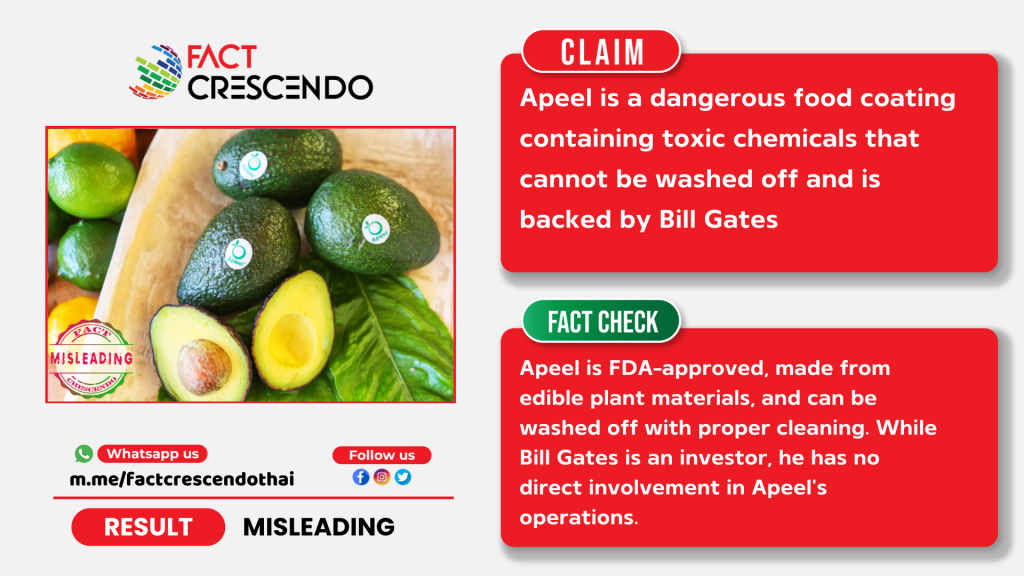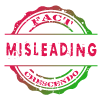
Apeel, a plant-derived food coating designed to extend the shelf life of produce, has been the subject of controversy and misinformation online. Critics have raised concerns about its transparency, safety, and potential to mask spoilage. Some have even linked it to Bill Gates, further fueling skepticism.
Social Media Claims
Multiple social media posts label Apeel as a “dangerous” food coating, claiming it’s a Bill Gates-backed product containing toxic chemicals like heavy metals and solvents, which “can’t be washed off.”
Fact Check
What Is Apeel?
Apeel is an edible, plant-based coating developed by ‘Apeel Sciences’, a California-based company founded in 2012. It’s made from monoglycerides and diglycerides—fatty acids derived from plant sources like grapeseed oil, soy, or other seeds.
Applied as a thin layer to fruits and vegetables, Apeel slows water loss and oxidation, two primary causes of spoilage. This can double or triple shelf life, reducing waste in regions with limited refrigeration and in retail settings like North American grocery stores.
Safety Evidence
The FDA has declared Apeel’s ingredients safe for consumption through their “Generally Recognized as Safe” (GRAS) program. According to their 2019 safety review, the plant-based fats used in Apeel are similar to those found in everyday foods like margarine and baked goods and are used within safe limits.
The FDA confirmed that these ingredients, mainly plant-derived fatty acids, are safe to use as a protective coating on produce. This edible layer works by keeping moisture in and oxygen out, which helps food stay fresh longer.
Additionally, the Environmental Protection Agency (EPA) has approved a variant called Organipeel as a fungicide for organic produce. It contains 0.66% citric acid (a natural preservative found in citrus fruits) as the active ingredient, with the remaining 99.34% being plant-derived glycerides (EPA Registration).
Independent reviews, such as those by Science Feedback and Saint Johns Organic Farm, confirm that the levels of these substances are far below thresholds for harm. For context, a person would need to consume thousands of coated apples daily to approach any risk—well beyond realistic scenarios.
Can it be washed off?
Contrary to claims, Apeel is not a permanent coating. Apeel Sciences states that it can be removed by rinsing produce with water and gently scrubbing with hands or a soft brush (Source). While designed to adhere during transport and storage, the coating breaks down under basic cleaning methods, similar to natural fruit waxes. This refutes assertions that it’s an unremovable chemical layer.
Bill Gates Connection
The Bill & Melinda Gates Foundation is one of many investors in ‘Apeel Sciences’, contributing to a $640 million funding pool alongside firms like Andreessen Horowitz and Temasek. The foundation’s involvement began in 2018, driven by its focus on sustainability and reducing food insecurity in developing regions. However, Gates neither owns nor controls ‘Apeel Sciences’; his investment reflects broader environmental goals, not a conspiracy to manipulate food safety.
Transparency and Research Gaps
Although ‘Apeel’ has FDA approval and safety data, researchers suggest we need more studies from independent labs. Right now, most of the evidence comes from Apeel’s own FDA application, with few outside labs testing the final product. Even though the ingredients are generally safe, we still don’t know much about possible long-term health effects or rare allergic reactions to the coating. While this isn’t a sign of danger, more openness from the company could help build trust with the public.
Conclusion
The claim that Apeel is dangerous and cannot be washed off is misleading. ‘Apeel’ is FDA-approved, made from edible plant materials, and lacks substantiated health risks. It can be washed off with water and gentle scrubbing using hands or a soft brush.
While Gates did invest in the company, there is no direct connection between Bill Gates and Apeel’s operations. Although food labelling transparency remains important, current evidence shows that Apeel is neither dangerous nor part of any broader food control scheme.



